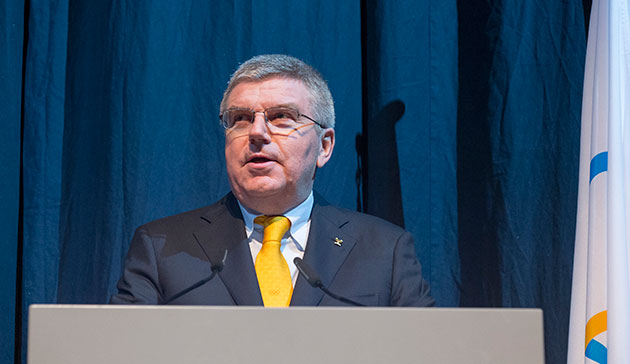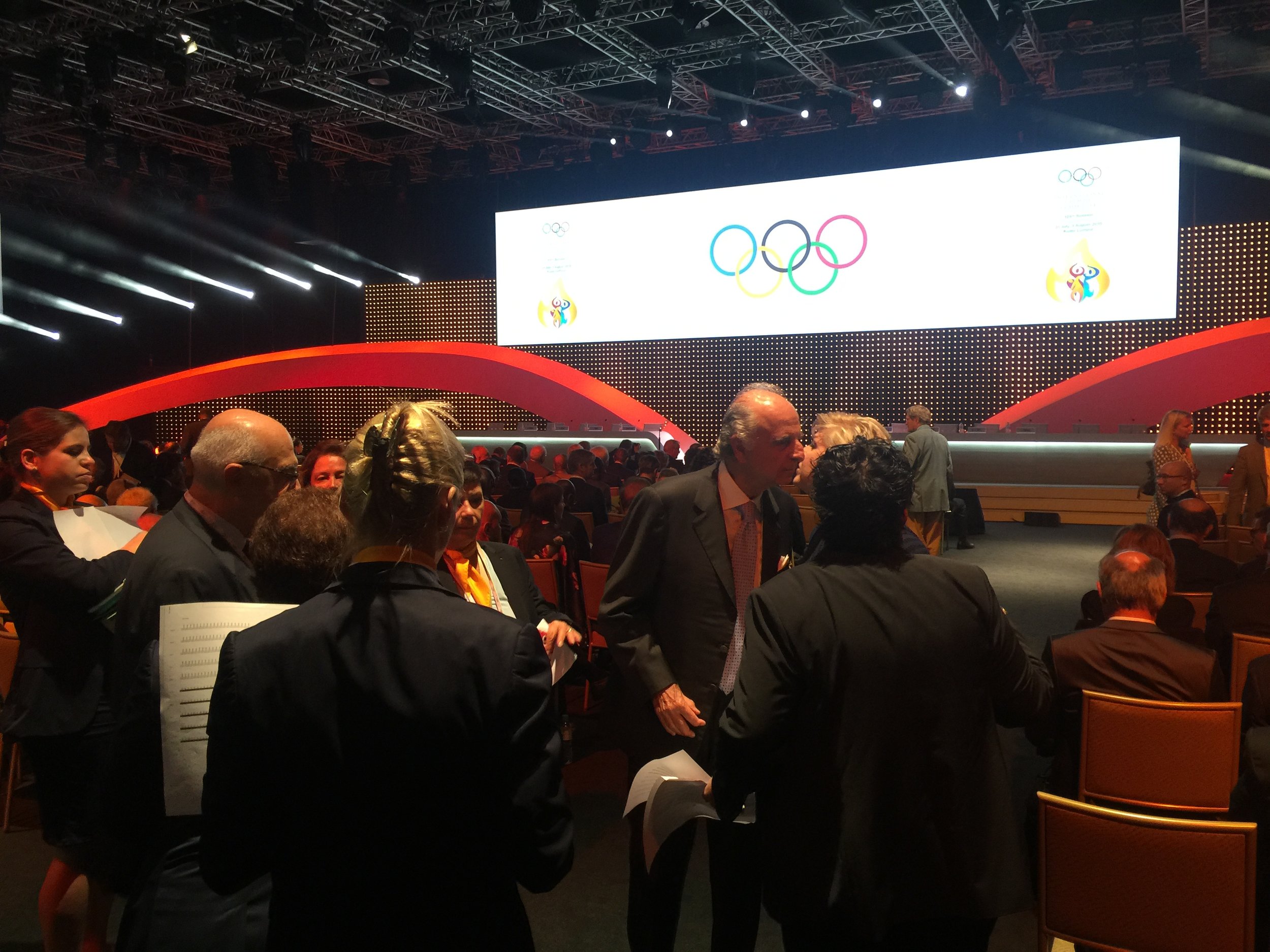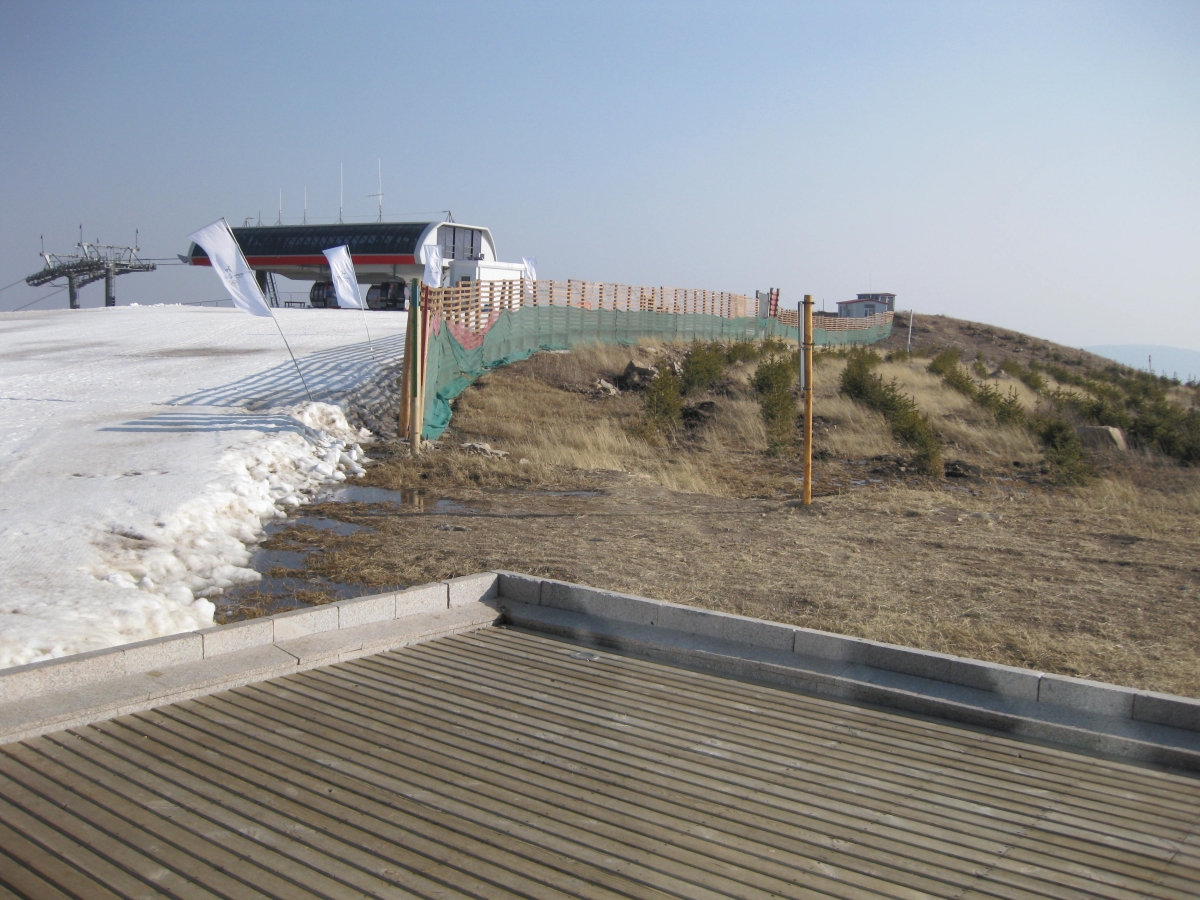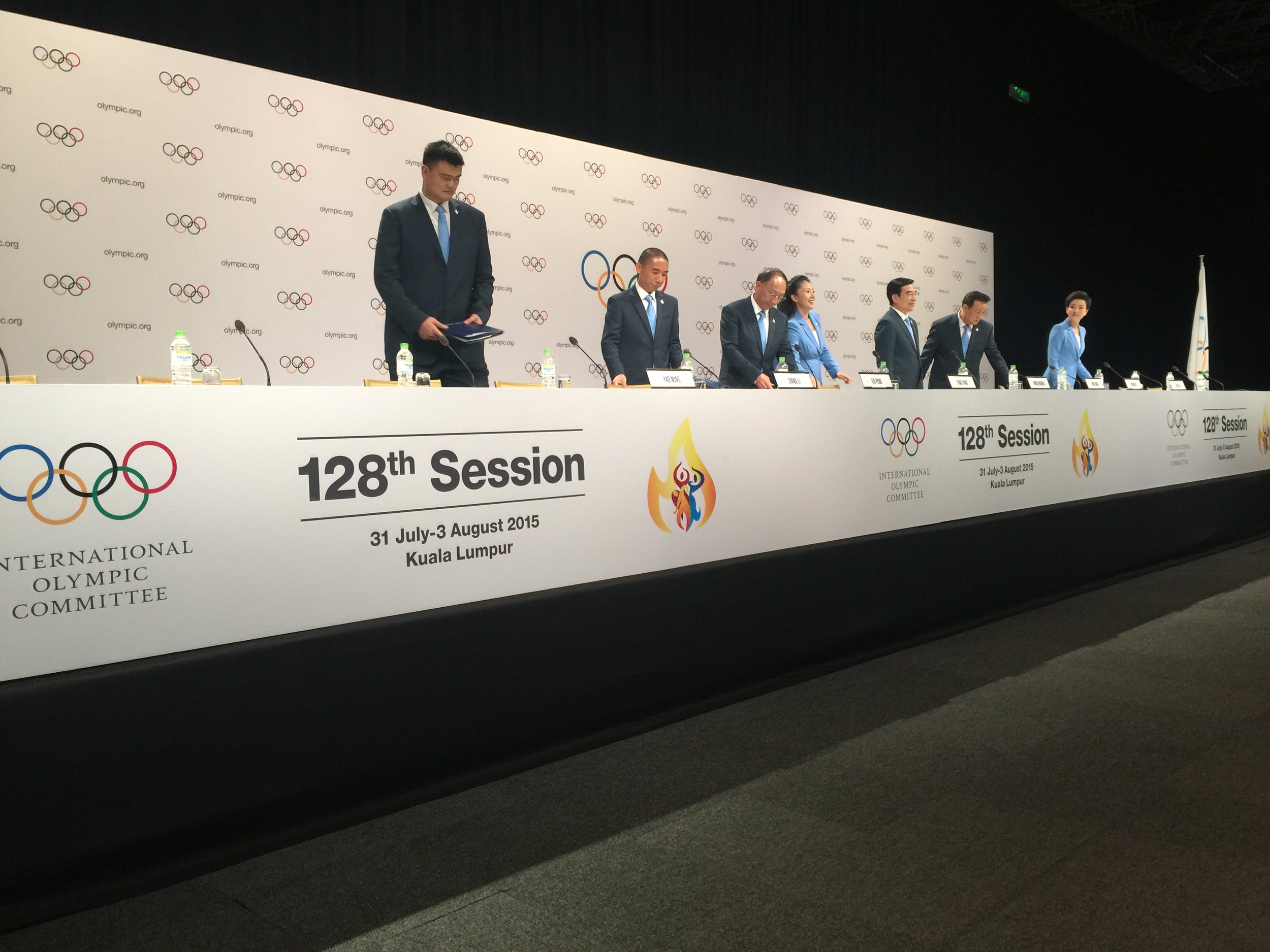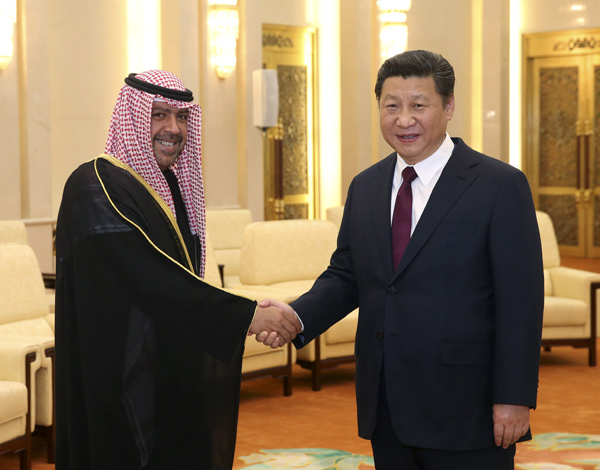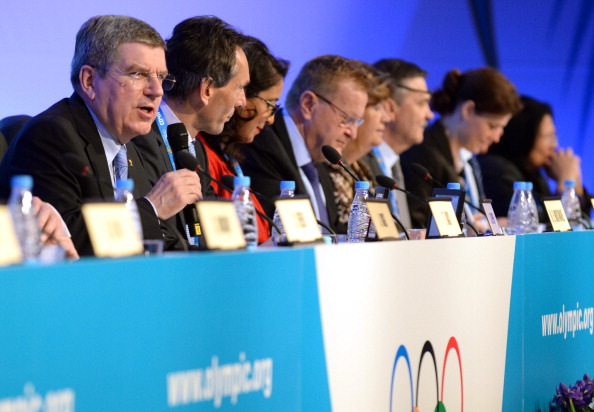KUALA LUMPUR, Malaysia — Earlier this week, when he opened the 128th International Olympic Committee session, president Thomas Bach declared of Agenda 2020, his would-be reform plan, “We need to demonstrate that we are indeed walking the walk and not just talking the talk.” On Friday, the members — the very same ones who fell into lockstep in approving Agenda 2020 last December — voted for Beijing to win the 2022 Winter Olympics. The count: 44-40, Beijing over Almaty, Kazakhstan.
Beijing, stage for the 2008 Summer Games, will become the first city to put on both the Summer and Winter Olympics.
Friday’s vote, the first major test of the 40-point Agenda 2020, revealed emphatically its major challenge: it is, in large measure, just so much noise until the IOC members actually follow its prescriptions.
There’s only one way for the IOC to really walk the walk. Therein lies a huge opportunity for the U.S. Olympic Committee and, now, Los Angeles for 2024.
Agenda 2020 promotes sustainability and feasibility. LA is tailor-made for such a blueprint. Almost all the venues stand ready, on the ground, for an Olympics; political and business support is rock-solid; the locals are hugely in favor of the effort, with poll numbers in favor of the Games in the 70s.
The Boston debacle, which ended Monday, is not going to make things easy for the USOC. Nor will the FIFA indictments. Nonetheless, Friday’s vote spotlights the path by which LA not only can but should win for 2024.
If LA saved the Games in 1984, now LA can not only save the USOC but Agenda 2020 — that is, make the reforms real, and make it possible for western democracies, and their taxpayers, to believe again in the Olympic Games.
Based on the chatter here in Kuala Lumpur, if Los Angeles bids, it would immediately become a formidable 2024 contender — with a real chance of winning.
Indeed, a strong LA bid would turn Boston into a fleeting memory -- an appropriate casualty of what now, via Agenda 2020, is called the "invitation phase" of the bid process. The USOC actually could, and should, emerge stronger for having gone through the months of Boston dithering.
On the other hand -- no LA bid will result in four years, or more, of Boston post-mortem.
That’s not the talk of someone who has lived in Los Angeles for more than 20 years. That’s talk that simply reflects what Bach says — if, that is, the IOC is going to walk the walk.
Paris is always awesome to visit but the French have to prove that they can overcome their traditional political and bid difficulties. (See Annecy 2018: seven votes.) Hamburg is not Berlin, and it’s now unclear how dramatically Friday’s vote for Beijing might impact the forthcoming Hamburg referendum, particularly since German voters shot Munich down not all that long ago.
Rome and Italy have financial woes. Budapest is uber-chic but 2024 in Hungary is likely going to be a hard sell. Toronto? Not yet a reality, and in choosing between Canada, which played host to the Games in Vancouver in 2010, and the United States, where the Olympics haven’t been held in a generation despite U.S. financial contributions, that’s a slam-dunk.
Baku? Not ready, at least for 2024, for prime time.
Been there, done that? That’s the knock against LA?
Not after Friday -- not after the IOC voted for Beijing in 2008 and again for 2022. That kills that LA-three times argument, and totally.
Listen to the words of Craig Reedie, an IOC executive board member from Great Britain, who earlier this week observed, “They won’t have to build temporary stadiums, which is expensive. It could be third-time lucky for LA. It was third-time lucky for London,” for 2012.
LA would make it so easy. Not to mention — obviously — fun.
The beaches. The weather. The restaurants. The stars.
Bach this week has made it abundantly clear that he expects a bid from the USOC. Indeed, he used the word “commitment" in emphasizing at a Wednesday news conference that an American bid is expected; on Thursday counted the USOC among those who had "already committed themselves to a candidature"; and on Friday published a pre-vote op-ed of sorts in which he noted that the United States was on the list of nations "seeking to host the 2024 Games."
Please pay close attention, each and every one of you on the USOC board of directors. Bach could not have made himself more explicit: there must be a 2024 U.S. bid. And not bidding for 2024 will not go down well for, say, 2026.
Logistically, the USOC has until Sept. 15 to name its candidate.
LA, San Francisco and Washington were the finalists against Boston. San Francisco and Washington were never viable candidates. That leaves only one option. Especially given the time constraints.
If the USOC wants to, say, hold sailing in San Francisco Bay — the kind of shared-city prospect Agenda 2020 expressly envisions — hey, have at it. That would, among other things, enable the Olympic Rings to go up the Golden Gate Bridge, which Bach is known to find a keen proposition.
But to be clear: this would be a Los Angeles bid. Never in a million years would the IOC be good with a joint bid, a suggestion floated this week in the San Francisco Chronicle. IOC rules say there is one person who signs the host-city contract, which provides guarantees against any financial shortfall — the mayor of the host city itself. That would be LA mayor Eric Garcetti, a huge backer of the Olympics.
For its part, LA officials should proclaim, loud and often, that Garcetti will sign that contract — the thing that purportedly caused Boston Mayor Marty Walsh to withdraw his support.
Any project involves risk. Such risk in LA is, however, extraordinarily minimal. The 1984 Games made a surplus of $232.5 million.
This 2024 bid thus offers LA, the USOC and the Olympic movement a new way forward, particularly in the United States, which the IOC — to be candid — seriously needs.
Chicago 2016 and New York 2012 foundered in part because of the demands of this contract.
For 2024, LA and the USOC should acknowledge that they are honest-to-goodness real partners, and that as partners the USOC would cover 25 percent — or some other equitable slice — of any shortfalls, should they occur.
The likelihood of which, again, is super-low.
It’s a no-lose, win-win proposition all around.
This would get LA and the USOC in the game, and with emphasis — showing that, especially in the United States, a Summer Games is a proposition not to be voted down but to be welcomed.
If the knock on the IOC right now is that only autocratic or dictatorial governments want the Games, what better?
So why, Friday, did the IOC membership vote for China?
Despite significant human rights concerns?
The awful air pollution?
The fact that there isn’t going to be anywhere near enough natural snow in the mountains?
That the Chinese are going to have to spend billions and billions to build a new high-speed rail line to connect the mountain venues, now hours away, from Beijing itself — and are not going to include that money in Olympic budgeting, making a mockery of Agenda 2020 concepts such as “transparency,” all just to avoid a Sochi-like financial reckoning?
Because, simply, with the Chinese the IOC knew it can — as the saying here repeatedly went — sleep at night.
In putting on those 2008 Games, the Chinese government, with its immense resource, spent at least $40 billion.
In a video shown Friday to the IOC members, Chinese President Xi Jinping expressed his “strongest support” for the Games. The project was described as a “national priority.” Xi promised a “fantastic, extraordinary and excellent” 2022 Games.
With that kind of backing, the IOC could be assured that — amid any and all controversies, now and into the future — the 2022 Games will, no problem, come off.
This was particularly key after difficulties in Sochi as well as the struggles in Rio for 2016.
Also: 1.4 billion Chinese represent a huge marketing opportunity for the international federations, sponsors and others. The sports industry in China was represented Friday to grow to an $800-billion industry by 2025.
Even before the vote, the IOC knew that it was headed back to Asia for a third straight Games — Pyeongchang, South Korea, in 2018, and Tokyo in 2020.
Over the course of the 2022 campaign, four western European democracies dropped out, all put off to varying degrees by the $51 billion figure associated with the Sochi 2014 Games or with the IOC itself: Oslo; Munich; Stockholm; and Krakow, Poland.
A fifth European city, Lviv, Ukraine, fell out because of war.
That left Beijing and Almaty.
The super-direct Almaty presentation on Friday, building off its slogan, "keeping it real," made for arguably the best any bid city has mounted since London, in 2005, won those 2012 Games.
“We want to help the IOC show the world that a country does not have to be a superpower, or spend tens of billions of dollars, to host the Winter Games,” Erlan Idrissov, the Kazakh foreign minister, told the members.
Prime Minister Karim Massimov directly confronted the notion that China was a safer choice.
“We’ve heard the sentiment that if you don’t select Almaty, then you, the IOC, can ‘sleep well at night’ for the next seven years. I find that a curious statement.”
He said the IOC had been “brave” on a number of prior occasions: challenging apartheid in South Africa, selecting Moscow for 1980 at the height of the Cold War and going to Beijing in 2008.
“Those were visionary, heroic declarations,” he said, “about sport’s ability to serve humanity. And, in each case, you were right. So today, we ask you to have faith in us, to have faith in Kazakhstan. Our request is not simply based on blind faith. It is based on facts, the facts that you need to make an historic decision — historic not only for Kazakhstan but for the Olympic movement as well.”
IOC sessions are typically long on diplomacy. Massimov, however, all but called the Chinese out, saying of Almaty 2022, “There were no fabrications about our compact venue plan, our travel times or our accommodation resources.
“There was no overstatement about public or political support, or our ability to host large-scale winter sports events.
“There was no enhancement of our beautiful mountains in the city, or our abundant, real snow and winter atmosphere.
“And there is no doubt about Kazakhstan’s financial stability.”
44-40. A new electronic voting system -- by tablet -- didn't work so ballots were, in the end, cast the old-fashioned way: by writing. Immediately unclear: whether the many conversations in the election room in the transition between the electronic and paper ballots proved pivotal in what amounted to Round 2 in a two-city vote.
44-40. Much closer than expected but nonetheless, in the end, Beijing prevailed.
Action speaks louder, way louder, than words. Agenda 2020 -- for real?
Now the page turns. Here comes the contest for 2024, and the chance to, as Bach said, walk the walk.


